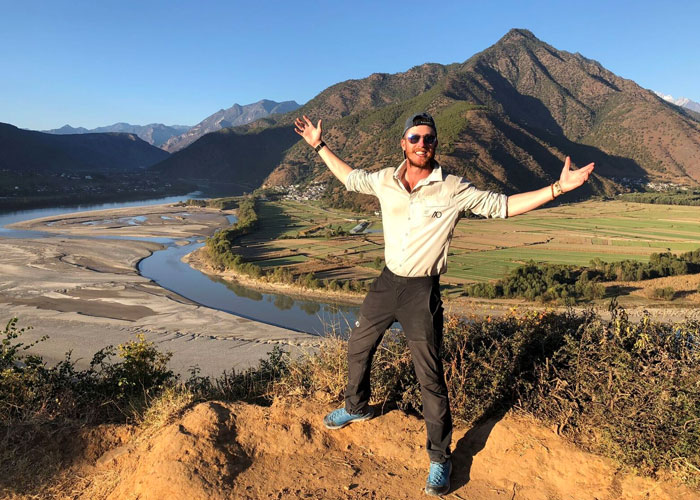
British adventurer and extreme athlete Ash Dykes, from North Wales, has just arrived at his second major milestone during Mission Yangtze, as he attempts to create history with a third world-first record, this time walking the entire 4,000 mile length of the Yangtze river in China – and he has been reassured to see the river has so far remained unaffected by plastic pollution.
Ash has reached the first major bend in the river, its southernmost point, where it takes a sharp 90 degree turn and flows to the northeast in the province of Yunnan, the third province Ash has entered, having previously trekked through Qinghai and Sichuan.
Seven members left the team due to altitude sickness
In the first 11 weeks of the adventure Ash has already completed 1,500 miles of the 4,000 mile journey, putting himself well within reach of his goal to complete the expedition within a year. Having begun at the scientific source of the river, at over 5,000m above sea level, Ash is now just below 2,000m above sea level.
Ash said,
“It’s been a wild adventure and more extreme than I could have ever imagined.
“Seven team members have already been taken off the expedition due to altitude sickness, injury or physically not being able to overcome the challenges that have presented themselves. The main thing is, they’re back home, safe and sound, with their families.”
How has Ash coped with the early stages of the mission?
“China has really proved to be more diverse and beautiful than I could have hoped for, but I’ve had to constantly stay alert and focussed. I’ve certainly been tested in many aspects but I’ve been able to overcome each challenge I’ve faced.”
From -20 degrees to a tropical climate
At the mission’s start, high on the plateau, Ash faced mountainous terrain including snow blizzards and -20 degree Celsius temperatures, bears migrating down from the mountains for their winter hibernation, wolves, and the vulnerability of long periods of isolation.
Having followed the river south Ash now finds himself in a warmer, tropical environment at a lower altitude, noting:
“There are more people, vegetation, plantations, paddy fields and more of the typical southeast Asian wildlife that can only survive in the warmer climate.”
Ash has been keen to get involved in the locals’ way of life, helped by his fast-developing language skills. Recently, he has worked paddy fields, cared for fruit and vegetable plantations, and helped local farmers with livestock such as pigs, chickens and cattle. It has been interesting seeing how the younger generations are utilising new technologies and influencing the ancient, traditional ways of their elders.
Little plastic pollution in the Yangtze
Over the next 500 miles Ash will see where rural China meets urban China and how they integrate with one another. Of particular interest for Ash personally will be the environment.
“Protection of the environment is very close to my heart and I always push out the message that you must enjoy this planet we live on, but also protect it.
“So far I’ve been keeping my eye out for plastic pollution and I can honestly say I’m surprised with how well cared for the Yangtze River and the tributaries that flow into it actually are. I’ve not seen much plastic in the waterways up to now.
“It’s against the Tibetan culture to disrespect nature in general and they naturally know how to care for the environment. Everything the nomads ever consumed or thrown away, for centuries, has always been harmless to the environment.”
Plastic is a recent introduction & education will be needed
Ash believes that the reason for the lack of plastic pollution is that it is relatively new, and calls for education to ensure inhabitants are aware of the damage plastic can cause, with many assuming plastic is biodegradable.
“They only need telling once. As soon as they’re aware of the harm it brings to nature and the wildlife within, they’re the best at making a change and finding an alternative. These are people that if they discard of their hot water, they throw it in the air first, for the water to cool down before hitting the ground – in case they harm insects living in the grass!
“As I continue my journey towards more populated areas, I’m keen to see what impact this may have. I’m already seeing more road construction along the river banks with rubble flowing downstream. China are making huge progress and pound for pound they are fighting climate change faster than any other country. I’ve seen so many new tree plantations, wind farms and solar panel sites during my journey.”
Ash has been keeping everyone posted on social media and continues to grow a huge following with fantastic engagement, sharing everything he comes across in real time. People can even track Ash on his website and see where he is, within 5 metres of his actual location.
Mandarin Films (Ash’s China-based production team who are creating a documentary of this expedition), are soon to release one minute teaser clips every week. This documentary coverage is heavily anticipated in the Chinese market and is expected to be popular in international markets too.